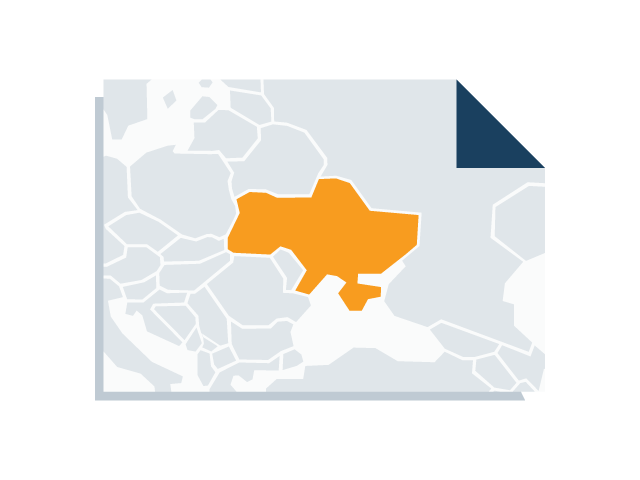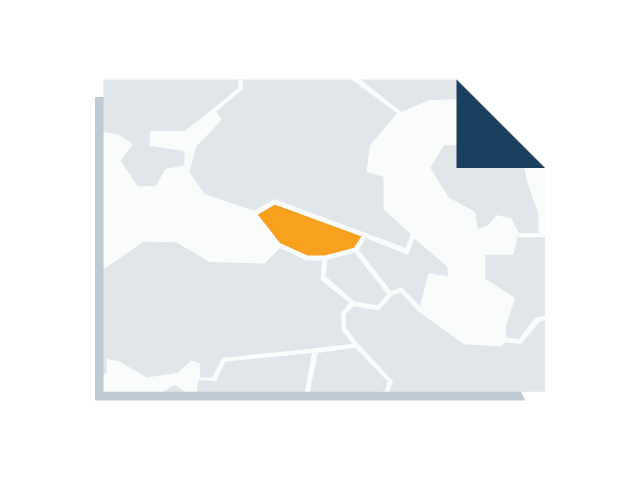AVERAGE SCORE
26READINESS AVERAGE
42IMPLEMENTATION AVG
29IMPACT AVERAGE
9This regional snapshot covers 18 countries in the Western Balkans, South Caucasus, Western Commonwealth of Independent States and Central Asia. Ten of those have been added since the third edition of the Barometer. Note that not all Europe and Central Asia countries assessed in the fourth edition of the Barometer are included in this assessment.
General regional highlights and findings
As a whole, the region has progressed significantly. The top five ranked countries — Russia, Moldova, Georgia, Bulgaria and Turkey — have all seen marked improvements in their Barometer scores in recent years. Yet, many countries in the region still prioritise e-government and open government initiatives, but are not yet unlocking benefits from broader open data initiatives.
Georgia (+20), Ukraine (+18) and Russia (+16) have made the biggest leaps in this edition’s ranking, with Ukraine being the first country in the region to adopt the Open Data Charter. Meanwhile Poland — dropping 14 places — and Macedonia — down 15 — show worrying backsliding.
Regional Ranking
| Global Rank | Score | Country | Readiness | Implementation | Impact |
|---|---|---|---|---|---|
| 25 | 49 |
 Russia
Russia
|
60 | 54 | 27 |
| 31 | 44 |
 Moldavia
Moldavia
|
55 | 54 | 14 |
| 40 | 37 |
 Georgia
Georgia
|
52 | 45 | 11 |
| 40 | 37 |
 Turkey
Turkey
|
35 | 53 | 15 |
| 44 | 36 |
 Ukraine
Ukraine
|
55 | 35 | 19 |
| 48 | 33 |
 Macedonia
Macedonia
|
57 | 29 | 13 |
| 50NEW | 32 |
 Albania
Albania
|
54 | 37 | 4 |
| 58NEW | 27 |
 Croatia
Croatia
|
52 | 24 | 8 |
| 59 | 26 |
 Kazakhstan
Kazakhstan
|
39 | 32 | 6 |
| 63NEW | 24 |
 Kosovo *
Kosovo *
|
47 | 21 | 7 |
| 65NEW | 23 |
 Serbia
Serbia
|
44 | 25 | 0 |
| 83NEW | 15 |
 Montenegro
Montenegro
|
33 | 13 | 4 |
| 87NEW | 13 |
 Kyrgyzstan
Kyrgyzstan
|
23 | 13 | 11 |
| 93NEW | 11 |
 Belarus
Belarus
|
27 | 10 | 2 |
| 97NEW | 10 |
 Tajikistan
Tajikistan
|
15 | 14 | 4 |
| 100NEW | 8 |
 Bosnia and Herzegovina
Bosnia and Herzegovina
|
24 | 7 | 0 |
Open Data Barometer 4th edition - Regional ranking
* For ODECA, references to Kosovo shall be understood to be in the context of Security Council Resolution 1244 (1999)
How’s the region performing against the rest of the world?
Readiness
Some countries have strong transparency and anti-corruption initiatives, such as Turkey’s Networks of Dispossession, which maps relationships of capital and power
Even regional champions such as Georgia, Bulgaria and Turkey score low on data management, support for innovation, civil society engagement and open data activity at the subnational level.
Implementation
Interestingly, of the 115 countries included in the Barometer, three out of the nine countries with fully open crime data, and three out of the seven countries with fully open environmental data are found in the region.
Only 4% of the data we analysed in the region was fully open. The regional champions still score low on openness of datasets - particularly on those necessary to foster government accountability.
Impact
Some countries are improving on political and economic impact, including Russia and Ukraine. Moldova has also a well-established public procurement open contracting portal
The impact on inclusion remains zero for more than half of the countries assessed, and remains very low for the rest. In some countries, including Moldova, impact on accountability and entrepreneurship has decreased in the edition.
Country Profiles

Ukraine is well positioned to be an open data leader in the region. It has made significant improvements and jumped 18 places in the rankings. It has adopted the Open Data Charter and the Open Contracting Data Standard, showing a strong policy commitment to open data. The country has strengthened its national open government data initiative, improved its open data policy and strategy, and has now better data management practices. Availability of data has improved overall, in particular for education, spending, company, and contracting datasets. However, Ukraine needs open licenses to have truly open datasets in all sectors

Georgia has made significant strides, jumping 20 places to become a top five regional champion. It has fully open education, crime, environment, and budget data, and has robust data protection and detailed Right to Information and Freedom of Information laws. The government has also increased support for open data innovation and training. The impact of open data on accountability and transparency has also increased, with stand-out projects like Tender Monitor Georgia, which uses data about government contracts to monitor tenders, gather information about suppliers and customers and analyse corruption risks.

